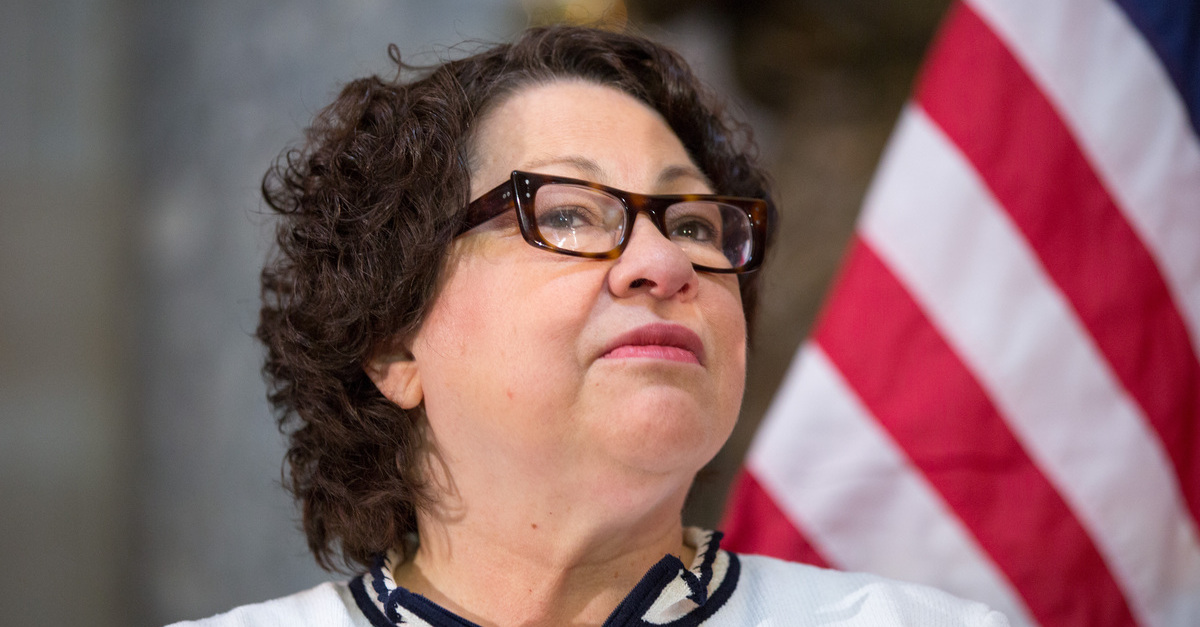
During Wednesday’s Supreme Court oral arguments, Justice Sonia Sotomayor appears to have stumbled on a little nugget of fact that totally tanked one of the Trump administration’s big strategies in the Affordable Care Act (ACA) contraception case. The case, Little Sisters of the Poor Saints Peter and Paul Home v. Pennsylvania, consolidates two lawsuits filed by New Jersey and Pennsylvania against the federal government (also see: Trump v. Pennsylvania).
Little Sisters of the Poor (a group of nuns who operate in about 30 countries, running nursing and retirement homes for the elderly) were not an original party to the lawsuit, but rather, were allowed to intervene in the litigation after submitting an amicus brief in support of the Trump administration’s position. In the Little Sisters of the Poor case, the Trump administration is defending its rule that allows private employers to raise a moral or religious objections as grounds to opt out of the portion of the ACA that requires employers to provide health insurance with contraceptive coverage.
From an optics perspective, Little Sisters’ involvement is perfect. Theirs is a non-profit organization run by nuns, but isn’t a house of worship (if it were a house of worship, it would be specifically exempt from the ACA’s requirement). The Little Sisters’ mission is basically the platinum-standard for humanitarian work.
As the Little Sisters explained in their amicus brief:
For 150 years, the Little Sisters of the Poor in the United States have provided an incomparable loving environment for elderly poor people, many of whom have nowhere else to go. The Little Sisters’ religious beliefs inspire them to give up their lives for this work, but they don’t force their religion on others; they provide this irreplaceable service regardless of religious affiliation, condition of dependency, or ability to pay. ..Because of their overwhelmingly positive experiences at homes of Little Sisters of the Poor, amici residents and their families want to support in the strongest way possible the continuation of the Little Sisters’ invaluable work.
Their brief went on to describe the dilemma in which the ACA puts them:
The Little Sisters believe that artificial contraception is immoral. The Little Sisters also believe that it is immoral to do a bad thing in order to do a good thing. Thus, they can’t justify facilitating artificial contraception in order to continue serving the poor people who need their help. That means that the homes that the Little Sisters operate, which so many residents and family members find indispensable, are now in jeopardy.
It’s a sad story. Ostensibly, the law is forcing the Little Sisters to do something that violates their conscience; if they follow their moral compasses, they’ll be fined, and all the people they selflessly serve will suffer:
Now the Little Sisters are being told by the lower courts that they must facilitate the provision of free contraceptives to their employees–in violation of their religiously informed consciences–or face huge fines that would endanger their ability to carry out their mission of mercy.
So much, according to the nuns, is at risk.
“The Little Sisters do not intend to violate their consciences. They do not have unlimited funds to pay massive fines to Big Brother. Their outlook, therefore, is bleak,” stated their case.
At oral argument, Paul Clement, arguing on behalf of Little Sisters, stressed that the nuns will not agree to be “complicit” in furthering the ACA’s contraception requirement in contravention of their sincere religious beliefs. Indeed, it is difficult to discount such an argument from a group of individuals who have given their lives to serve others.
But at oral arguments, a fact slipped out that changes things a bit. Clement explained to the justices that the Little Sisters’ health insurer will not provide contraceptive coverage–“no matter what”–because their plan is a church plan that is exempt from legal requirements.
In other words, the Little Sisters really aren’t at risk for being fined for non-compliance. They were never required to comply with the contraceptive mandate and they will face exactly zero penalties whether or not they provide the kind of coverage the ACA demands.
This appeared to be news to Justice Sotomayor, who said, “That’s an interesting point, I didn’t know that the Little Sisters’ Claim is actually moot here.”
One wonders, in this context, whether “moot” is actually code for “total nonsense.” The Little Sisters had characterized their plight as a grim financial one. If fined for noncompliance, they’d be at risk for shutting down. Absent such a risk, it’s tough to see why the Supreme Court should even be listening to what this group has to say.
More broadly, SCOTUS is deciding whether to widen the aperture for a conscience-based objection to following federal law. The idea that 1) those purporting to be conscience-driven are advancing a disingenuous argument; and 2) the law already provides ample protection for the group making that very argument isn’t likely to be lost on the justices.
[image via Allison Shelley/Getty Images]
This is an opinion piece. The views expressed in this article are those of just the author.